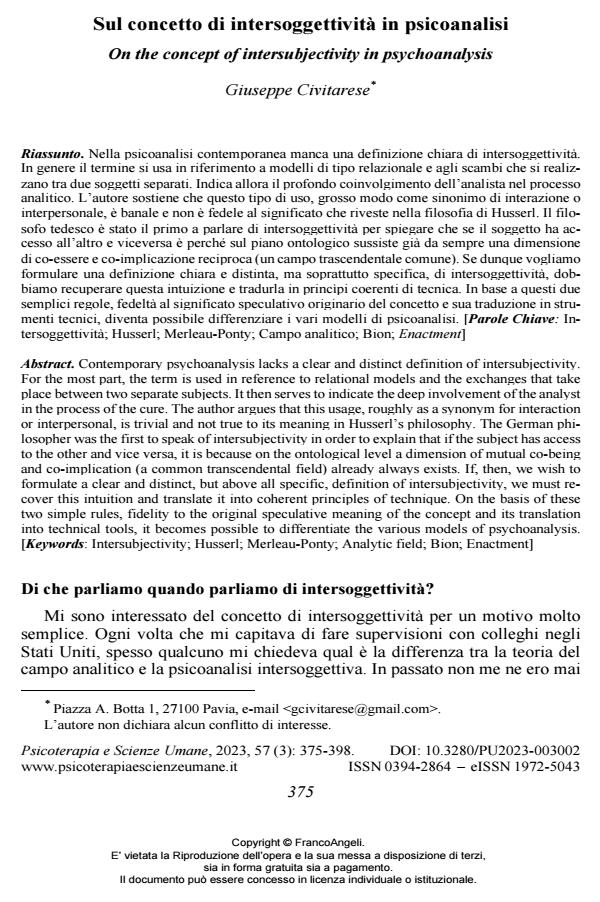Sul concetto di intersoggettività in psicoanalisi
Titolo Rivista PSICOTERAPIA E SCIENZE UMANE
Autori/Curatori Giuseppe Civitarese
Anno di pubblicazione 2023 Fascicolo 2023/3
Lingua Italiano Numero pagine 24 P. 375-398 Dimensione file 146 KB
DOI 10.3280/PU2023-003002
Il DOI è il codice a barre della proprietà intellettuale: per saperne di più
clicca qui
Qui sotto puoi vedere in anteprima la prima pagina di questo articolo.
Se questo articolo ti interessa, lo puoi acquistare (e scaricare in formato pdf) seguendo le facili indicazioni per acquistare il download credit. Acquista Download Credits per scaricare questo Articolo in formato PDF

FrancoAngeli è membro della Publishers International Linking Association, Inc (PILA), associazione indipendente e non profit per facilitare (attraverso i servizi tecnologici implementati da CrossRef.org) l’accesso degli studiosi ai contenuti digitali nelle pubblicazioni professionali e scientifiche.
Nella psicoanalisi contemporanea manca una definizione chiara di intersoggettività. In genere il termine si usa in riferimento a modelli di tipo relazionale e agli scambi che si realiz- zano tra due soggetti separati. Indica allora il profondo coinvolgimento dell’analista nel processo analitico. L’autore sostiene che questo tipo di uso, grosso modo come sinonimo di interazione o interpersonale, è banale e non è fedele al significato che riveste nella filosofia di Husserl. Il filo- sofo tedesco è stato il primo a parlare di intersoggettività per spiegare che se il soggetto ha ac- cesso all’altro e viceversa è perché sul piano ontologico sussiste già da sempre una dimensione di co-essere e co-implicazione reciproca (un campo trascendentale comune). Se dunque vogliamo formulare una definizione chiara e distinta, ma soprattutto specifica, di intersoggettività, dob- biamo recuperare questa intuizione e tradurla in princìpi coerenti di tecnica. In base a questi due semplici regole, fedeltà al significato speculativo originario del concetto e sua traduzione in stru- menti tecnici, diventa possibile differenziare i vari modelli di psicoanalisi.
Parole chiave:Intersoggettività; Husserl; Merleau-Ponty; Campo analitico; Bion; Enactment]
- Essere o non essere Habermas. Una risposta alla controreplica di Mauro Fornaro Giuseppe Civitarese, in PSICOTERAPIA E SCIENZE UMANE 3/2023 pp.449
DOI: 10.3280/PU2023-003007 - Un approccio estetico allo Sviluppo Organizzativo. In dialogo con Pagliarani Francesco Liuzzi, Alessandro Kadolph, in EDUCAZIONE SENTIMENTALE 39/2024 pp.107
DOI: 10.3280/EDS2023-039011 - Perché Husserl non quadra col campo psicoanalitico e altre annotazioni. Replica a Giuseppe Civitarese Mauro Fornaro, in PSICOTERAPIA E SCIENZE UMANE 3/2023 pp.413
DOI: 10.3280/PU2023-003004 - Considerazioni sull'articolo di Giuseppe Civitarese "Sul concetto di intersoggettività in psicoanalisi" Filippo Maria Ferro, Giuseppe Riefolo, in PSICOTERAPIA E SCIENZE UMANE 3/2023 pp.399
DOI: 10.3280/PU2023-003003 - Il valore dell'intertestualità per il progresso della psicoanalisi. Replica ai commenti di F.M. Ferro & G. Riefolo e di M. Fornaro al saggio "Sul concetto di intersoggettività in psicoanalisi" Giuseppe Civitarese, in PSICOTERAPIA E SCIENZE UMANE 3/2023 pp.423
DOI: 10.3280/PU2023-003005 - On Bion’s Concept of Truth in an Extra-Moral Sense Giuseppe Civitarese, in The American Journal of Psychoanalysis /2023 pp.495
DOI: 10.1057/s11231-023-09430-w
Giuseppe Civitarese, Sul concetto di intersoggettività in psicoanalisi in "PSICOTERAPIA E SCIENZE UMANE" 3/2023, pp 375-398, DOI: 10.3280/PU2023-003002